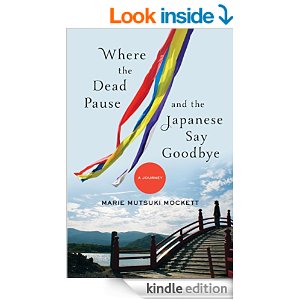 Marie Mutsuki Mockett is a Japanese-American writer whose overseas relatives were at the epicenter of the tragic March 11, 2011 killer earthquake and tsunami that devastated the northeast coast of Japan.
Marie Mutsuki Mockett is a Japanese-American writer whose overseas relatives were at the epicenter of the tragic March 11, 2011 killer earthquake and tsunami that devastated the northeast coast of Japan.
The author of a novel titled [easyazon-link asin=”1555975763″ locale=”us”]Picking Bones from Ash: A Novel[/easyazon-link], Mockett has written a memoir titled [easyazon-link asin=”0393063011″ locale=”us”]Where the Dead Pause, and the Japanese Say Goodbye[/easyazon-link] that is set to wash across the pages American readers this spring.
As the fourth anniversary of the tragic quake and tsunami that killed some 25,000 people approaches, Mockett’s book has been timed to appear at an opportune time for reflection and prayer.
Mockett, based in New York, spent the last few years working on the book, she said in a recent email, noting: “Since childhood, I’ve had a close association with Tohoku; our family owns and runs a Zen Buddhist temple in Iwaki, which is about 25 miles from the Fukushima Daiichi Nuclear Reactor. When the…earthquake and ensuing catastrophe struck, I was frantic about my family, and wrote an oped which appeared in the New York Times [a few days later].”
The oped, headlined ”Memories, Washed Away,” spoke of Mockett’s personal concern and grief.
“For 36 hours after the earthquake and tsunami that eviscerated the east coast of Japan on Friday, I was unable to get any word from my relatives who oversee and live in our family’s Buddhist temple in Iwaki City, south of Sendai, the biggest city near the epicenter,” she wrote in the Times, adding: “When I was a child growing up in California, my Japanese mother would ask me, ‘How do you know a tsunami is coming?'”
The new memoir, published this month, examines how people grieve, and how an old culture like Japan grapples with such difficult questions like: where do the dead go? What do the Japanese do when they can’t get over something traumatic? Do the dead come back to haunt us? The haunting memoir has been described, pre-publication, as ”a beautiful tale that is part evocative travelogue and part lyrical meditation on grief.”
Reviews are coming in, and they’re good: The Library Journal gave the book a starred review. Barnes and Noble has already named it a Discover Pick for this spring.
“After 36 hours [had elapsed], I [was able to get] through to my [relatives] at the temple in Iwaki,” Mockett wrote in her Times oped. “My relatives are unharmed, but there are new fears of a catastrophic meltdown at the Fukushima Daiichi nuclear power plant, just 30 miles away. One of the family cars is full of gas, and they assure me that they can escape at a moment’s notice. Fuel is in short supply, so in this, they are lucky.”
“The job of the keepers of a Buddhist temple, after all, is to help shepherd souls into and through the afterlife,” Mockett noted. “Since they were children, my cousins have held wakes, chanted sutras over dead bodies, and anticipated the needs of those in mourning. Nuclear fallout or no nuclear fallout, their neighbors will need them.”
Mockett’s memoir is gathering word-of-mouth steam already. Set to to share the stage at an upcoming Asian American Writers Workshop in New York in early February with Emily St. John Mandel, author of the dystopian stunner “Station Eleven,” Mockett is also scheduled to appear at a book event in San Francisco with “California” author Edan Lepucki, a ”Colbert Report” author whose dystopiana has already been optioned by a Hollywood studio.
For Marie Mutsuki Mockett, her new memoir is both a happy and an unhappy event — happy because it marks an a huge upward curve in her career, yet unhappy because it’s about something unspeakable and tragic that happened one day in 2011 and without warning.
































UPDATE: 4th graf: Mockett, based in SAN FRANCISCO, where she lives with her husband and their son. Her mother from Japan and her father from Germany, met long ago in Austria where they were both studying at an art school in Vienna. NOTE: As the author was writing the memoir previewed here, her father passed away.